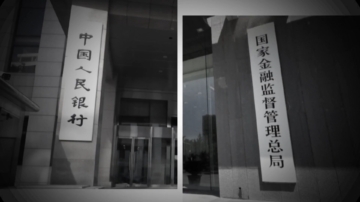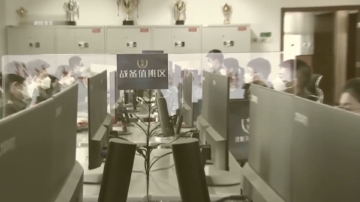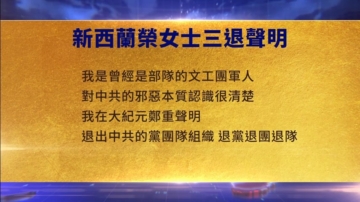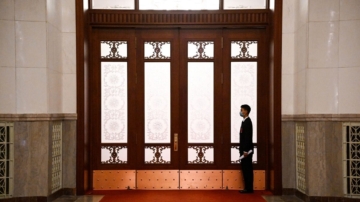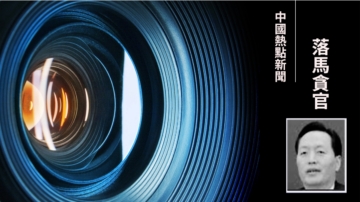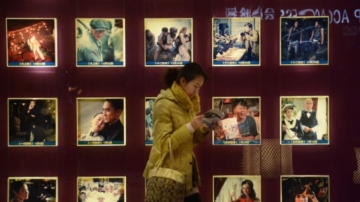【新唐人2013年08月15日訊】中國大陸上海高院法官集體召妓曝光後,上海高院院長的「敵對勢力」論又再令人側目。有網友搜索了中國各省直轄市的31名高院院長的履歷,發現他們當中,只有一個人通過司法資格考試,有20人不是法學科班出身,14人沒有正規大學學歷。大陸法律界人士披露,在中國法院院長多數是從行政部門調任,並非法律專業人士,甚至還懷疑,現任最高法院院長週強也未參加司法資格考試。
上海高院代院長崔亞東在總結法官招妓的教訓時說:此事件給境內外敵對勢力藉機攻擊黨和政府提供了可乘之機。這番驚天言論引髮網友好奇,中國的法院院長究竟是一群甚麼樣的人?一個叫曹開林的博主對中國大陸的31名高院院長作了一個統計,這項統計嚇壞了網友。
統計顯示,31名高院院長中,大學學歷17人,自考1人,黨校學歷13人;法學科班出身11人,通過司法考試1人;既沒有法學經歷又沒有普通大學學歷的有七人,包括上海高院崔亞東,內蒙古高院胡毅鋒,山西高院左世忠,甘肅高院梁明遠,安徽高院張堅,寧夏高院李彥凱,陝西高院閻慶文。曹開林還提醒說,這七個人可能值得重點關注,冤案發生的機率可能會高一些。
原中國青年政治學院法律系副教授楊支柱向《新唐人》表示,這種事情在中國並不奇怪。在中共體制下,一般案子大多數是主管副院長簽字。院長實際上他可能是一個不管業務的人。
原中國青年政治學院副教授楊支柱:「你比如有一個副院長管民事案件,有一個副院長管刑事案件。那麼院長管甚麼呢?好多院長他管用人,誰當副院長,誰當庭長?封官他管。另外一個管甚麼呢?管錢、蓋樓,這個樓該不該蓋?甚麼時候蓋?他管這個。」
楊支柱透露說,他所接觸的一些法官,甚至希望院長是個外行。因為外行院長他可能從別的部門,比如組織部或財政廳調過來,這樣的話,他在外面就有更多的資源,可以為法官帶來更多的福利。
根據中共法律規定,在2002年之後,初任法官、初任檢察官和取得律師資格必須通過國家司法考試。但是事實上,中共的法院院長常常從其他部門調配,而且民眾也未聽說他們參加了司法資格考試,即使在2002年新規定生效之後也是如此。楊支柱甚至懷疑,現任最高法院院長周強或許也沒有參加司法資格考試。
楊支柱:「週強有沒有參加過司法資格考試?我懷疑就沒有。周強這個人原來在司法部幹了一段。後來就在我們共青團當共青團的書記。後來到湖南當省委書記,他甚麼時候做過法官?也沒有做過法官。他就沒有參加過司法資格考試,我覺得。」
而據北京凱泰律師事務所律師謝燕益的了解,往往法院院長都是由其他行政部門的官員直接調任的,可能多數都未參加司法資格考試。
北京凱泰律師事務所律師謝燕益:「據我了解,我們那個地方確實有一個法院的庭長還是副院長參加司法考試,還是一個比較轟動的事情,還說這個人很自強,當領導幹部,當院裡的領導,他居然還參加司法考試。這個反而成為一個新聞了。」
杭州維權律師王成表示,高院院長基本上應該是二級大法官,在國家的司法系統內是一個非常高的位置。如果像這樣位置的人都是一些非法律專業的人,甚至根本連一個本科文憑都沒有,是非常荒唐的事情。
杭州維權律師王成:「可以肯定的說,這個國家的司法系統的裁判水平不可能很高。同時本身也印證這麼多年來,中國的法院系統裁判的水平是非常的低。有很多不公正的裁判。包括很多年來,從中央到地方,各級的人大表決法院的工作報告的時候,都出現了很多反對票。」
謝燕益表示,中共最高院要求對於一些重大案件,法院院長要參與審理工作。如果他沒有司法資格,沒有法官的專業知識,就很可能出現枉法裁判,就會對社會造成很大的傷害。
採訪編輯/秦雪 後製/葛雷
Serious Doubts Cast Over Court President's Qualifications in China
Since Shanghai judges' sex scandal was exposed,
the President of Shanghai's High Court theory of
"hostile force", aroused public condemnation and ridicule.
Netizens surfed the internet and collected
the profiles of 31 Court Presidents.
There is only one person with proper judicial qualifications.
20 so called judges did not major in law at the college,
14 of them don't have any university qualification.
Legal experts in Mainland China revealed that the majority
of Court Presidents were transferred from the civil service.
They are not the legal experts. They are not legally qualified.
People now have doubts that Zhou Qiang, the Supreme Court
President has any judicial qualification or passed any exams.
Cui Yadong, Acting President of the Shanghai
High Court has claimed that the sex scandal incident
provided a loophole for hostile forces at home and abroad
to attack the Chinese Communist Party (CCP) and governments.
Cui's words triggered netizens curiosity.
What kind of group is the Court Presidents in China?
Netizen Cao Kailin did a research survey of 31 High Court
Presidents. The results have astonished and terrified netizens.
It shows that among 31 High Courts, only 17 Presidents
have university qualifications, one finished the degree in their spare time.
13 have the CCP school qualification; 11 studied law at
University. Only one passed the judicial exam.
7 Presidents have neither legal qualification nor general
university qualification.
It includes Cui Yadong in Shanghai, Hu Yifeng in Inner
Mongolia, Zuo Shizhong in Shanxi, Liang Mingyuan in Gansu,
Zhang Jian in Anhui, Li Yankai in Ningxia,
and Yan Qingwen in Shan'anxi.
Cao Kailin warns that people need to keep an eye
on those 7 Unqualified Presidents,
miscarriage of justice is in danger of happening.
Yang Zhizhu, former deputy Professor in law told NTD that
this kind of issue is common in China.
Under the Chinese Communist regime, the general case is
mostly assigned to the Vice President of the Court.
The Presidents are probably not involved in actual practice.
Yang Zhizhu: "For example, one Deputy President of
a Court deals with civil cases,
another Deputy President deals with criminal cases.
What does the President of the court do?
Many of them are in charge of human resources,
choosing and vetting Deputy Presidents.
They are also in charge of the finances and
construction projects: deciding whether and when
to implement construction projects."
Yang Zhizhu reveals that some judges he knew said
they hoped that the Court Presidents know nothing about law.
Because under these circumstance, he could be
transferred from civil organs, to financial organs.
If so, he could have many economic contacts,
bringing more profits to the judges.
According to Chinese law, after 2002, new judges and new
Public Prosecutors must pass the national judicial exam.
Actually, the Presidents of the Court are generally
transferred from other bodies.
Nobody has ever heard of any of them ever taken
such an exam.
So even though there is a new Law since 2002,
nothing has changed.
Yang Zhizhu doubts that Zhou Qiang has taken the exam.
Yang Zhizhu: "Has Zhou Qiang taken the exam? I doubt it.
Zhou served in the justice department for a while.
Later he became Youth League secretary.
Then he was transferred to be a provincial party
secretary in Hunan.
When did he serve as a judge? Never.
I believe he has never taken a judicial exam."
According to lawyer Xie Yanyi of Kaitai Law firm in Beijing,
normally Court Presidents are directly transferred from other
civil bodies. The majority of them didn't take judicial exam.
Xie Yanyi: "From what I have learned in our area there is only
one local Court Deputy President that took the judicial exam.
It became sensational issue. People said that this person
worked hard, being a leader, a court leader,
he took the judicial examination. This was big news."
Wang Cheng, a human rights lawyer in Hangzhou said that
the High Court President should essentially be
a second degree Grand Justice.
It is a very high position in the judicial industry in this country.
If such a position were taken by legally unqualified persons,
that don't have any university qualifications, it is an absolute nonsense.
Wang Cheng: "Certainly, this country's judicial system
is of very low quality. Over the years,
it has been proven that China's judicial system
is very poor. Many cases of miscarriage of justice exist.
Year in, year out, from central government to local
government, and at all levels of the people's congresses,
surveys of court standards are negative."
Xie Yanyi said that the Supreme Court in China requests
Court Presidents to participate in the trial cases.
If one doesn't have judicial qualifications,
he has no judicial expertise.
This can lead to miscarriage of justice.
Thus, it will bring grave harm to society.
上海高院代院長崔亞東在總結法官招妓的教訓時說:此事件給境內外敵對勢力藉機攻擊黨和政府提供了可乘之機。這番驚天言論引髮網友好奇,中國的法院院長究竟是一群甚麼樣的人?一個叫曹開林的博主對中國大陸的31名高院院長作了一個統計,這項統計嚇壞了網友。
統計顯示,31名高院院長中,大學學歷17人,自考1人,黨校學歷13人;法學科班出身11人,通過司法考試1人;既沒有法學經歷又沒有普通大學學歷的有七人,包括上海高院崔亞東,內蒙古高院胡毅鋒,山西高院左世忠,甘肅高院梁明遠,安徽高院張堅,寧夏高院李彥凱,陝西高院閻慶文。曹開林還提醒說,這七個人可能值得重點關注,冤案發生的機率可能會高一些。
原中國青年政治學院法律系副教授楊支柱向《新唐人》表示,這種事情在中國並不奇怪。在中共體制下,一般案子大多數是主管副院長簽字。院長實際上他可能是一個不管業務的人。
原中國青年政治學院副教授楊支柱:「你比如有一個副院長管民事案件,有一個副院長管刑事案件。那麼院長管甚麼呢?好多院長他管用人,誰當副院長,誰當庭長?封官他管。另外一個管甚麼呢?管錢、蓋樓,這個樓該不該蓋?甚麼時候蓋?他管這個。」
楊支柱透露說,他所接觸的一些法官,甚至希望院長是個外行。因為外行院長他可能從別的部門,比如組織部或財政廳調過來,這樣的話,他在外面就有更多的資源,可以為法官帶來更多的福利。
根據中共法律規定,在2002年之後,初任法官、初任檢察官和取得律師資格必須通過國家司法考試。但是事實上,中共的法院院長常常從其他部門調配,而且民眾也未聽說他們參加了司法資格考試,即使在2002年新規定生效之後也是如此。楊支柱甚至懷疑,現任最高法院院長周強或許也沒有參加司法資格考試。
楊支柱:「週強有沒有參加過司法資格考試?我懷疑就沒有。周強這個人原來在司法部幹了一段。後來就在我們共青團當共青團的書記。後來到湖南當省委書記,他甚麼時候做過法官?也沒有做過法官。他就沒有參加過司法資格考試,我覺得。」
而據北京凱泰律師事務所律師謝燕益的了解,往往法院院長都是由其他行政部門的官員直接調任的,可能多數都未參加司法資格考試。
北京凱泰律師事務所律師謝燕益:「據我了解,我們那個地方確實有一個法院的庭長還是副院長參加司法考試,還是一個比較轟動的事情,還說這個人很自強,當領導幹部,當院裡的領導,他居然還參加司法考試。這個反而成為一個新聞了。」
杭州維權律師王成表示,高院院長基本上應該是二級大法官,在國家的司法系統內是一個非常高的位置。如果像這樣位置的人都是一些非法律專業的人,甚至根本連一個本科文憑都沒有,是非常荒唐的事情。
杭州維權律師王成:「可以肯定的說,這個國家的司法系統的裁判水平不可能很高。同時本身也印證這麼多年來,中國的法院系統裁判的水平是非常的低。有很多不公正的裁判。包括很多年來,從中央到地方,各級的人大表決法院的工作報告的時候,都出現了很多反對票。」
謝燕益表示,中共最高院要求對於一些重大案件,法院院長要參與審理工作。如果他沒有司法資格,沒有法官的專業知識,就很可能出現枉法裁判,就會對社會造成很大的傷害。
採訪編輯/秦雪 後製/葛雷
Serious Doubts Cast Over Court President's Qualifications in China
Since Shanghai judges' sex scandal was exposed,
the President of Shanghai's High Court theory of
"hostile force", aroused public condemnation and ridicule.
Netizens surfed the internet and collected
the profiles of 31 Court Presidents.
There is only one person with proper judicial qualifications.
20 so called judges did not major in law at the college,
14 of them don't have any university qualification.
Legal experts in Mainland China revealed that the majority
of Court Presidents were transferred from the civil service.
They are not the legal experts. They are not legally qualified.
People now have doubts that Zhou Qiang, the Supreme Court
President has any judicial qualification or passed any exams.
Cui Yadong, Acting President of the Shanghai
High Court has claimed that the sex scandal incident
provided a loophole for hostile forces at home and abroad
to attack the Chinese Communist Party (CCP) and governments.
Cui's words triggered netizens curiosity.
What kind of group is the Court Presidents in China?
Netizen Cao Kailin did a research survey of 31 High Court
Presidents. The results have astonished and terrified netizens.
It shows that among 31 High Courts, only 17 Presidents
have university qualifications, one finished the degree in their spare time.
13 have the CCP school qualification; 11 studied law at
University. Only one passed the judicial exam.
7 Presidents have neither legal qualification nor general
university qualification.
It includes Cui Yadong in Shanghai, Hu Yifeng in Inner
Mongolia, Zuo Shizhong in Shanxi, Liang Mingyuan in Gansu,
Zhang Jian in Anhui, Li Yankai in Ningxia,
and Yan Qingwen in Shan'anxi.
Cao Kailin warns that people need to keep an eye
on those 7 Unqualified Presidents,
miscarriage of justice is in danger of happening.
Yang Zhizhu, former deputy Professor in law told NTD that
this kind of issue is common in China.
Under the Chinese Communist regime, the general case is
mostly assigned to the Vice President of the Court.
The Presidents are probably not involved in actual practice.
Yang Zhizhu: "For example, one Deputy President of
a Court deals with civil cases,
another Deputy President deals with criminal cases.
What does the President of the court do?
Many of them are in charge of human resources,
choosing and vetting Deputy Presidents.
They are also in charge of the finances and
construction projects: deciding whether and when
to implement construction projects."
Yang Zhizhu reveals that some judges he knew said
they hoped that the Court Presidents know nothing about law.
Because under these circumstance, he could be
transferred from civil organs, to financial organs.
If so, he could have many economic contacts,
bringing more profits to the judges.
According to Chinese law, after 2002, new judges and new
Public Prosecutors must pass the national judicial exam.
Actually, the Presidents of the Court are generally
transferred from other bodies.
Nobody has ever heard of any of them ever taken
such an exam.
So even though there is a new Law since 2002,
nothing has changed.
Yang Zhizhu doubts that Zhou Qiang has taken the exam.
Yang Zhizhu: "Has Zhou Qiang taken the exam? I doubt it.
Zhou served in the justice department for a while.
Later he became Youth League secretary.
Then he was transferred to be a provincial party
secretary in Hunan.
When did he serve as a judge? Never.
I believe he has never taken a judicial exam."
According to lawyer Xie Yanyi of Kaitai Law firm in Beijing,
normally Court Presidents are directly transferred from other
civil bodies. The majority of them didn't take judicial exam.
Xie Yanyi: "From what I have learned in our area there is only
one local Court Deputy President that took the judicial exam.
It became sensational issue. People said that this person
worked hard, being a leader, a court leader,
he took the judicial examination. This was big news."
Wang Cheng, a human rights lawyer in Hangzhou said that
the High Court President should essentially be
a second degree Grand Justice.
It is a very high position in the judicial industry in this country.
If such a position were taken by legally unqualified persons,
that don't have any university qualifications, it is an absolute nonsense.
Wang Cheng: "Certainly, this country's judicial system
is of very low quality. Over the years,
it has been proven that China's judicial system
is very poor. Many cases of miscarriage of justice exist.
Year in, year out, from central government to local
government, and at all levels of the people's congresses,
surveys of court standards are negative."
Xie Yanyi said that the Supreme Court in China requests
Court Presidents to participate in the trial cases.
If one doesn't have judicial qualifications,
he has no judicial expertise.
This can lead to miscarriage of justice.
Thus, it will bring grave harm to society.


